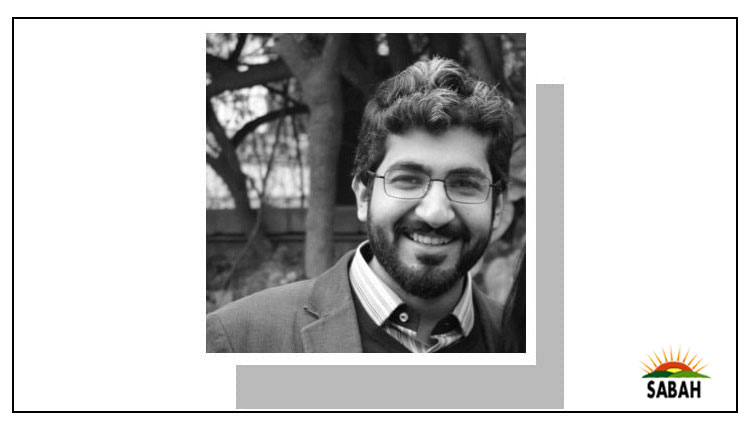Principled objection…Umair Javed
ANYONE professing a commitment to principles because of their occupation or their stated ideology should not find it particularly difficult to condemn the recent police action at Imran Khans residence in Lahore. Such situations, rather than elaborate fictional scenarios, are exactly where principles are at their most useful.
Pakistans political history is such that the cast of characters on one side of any issue changes very frequently. The party enabling state oppression may find itself on the receiving end within the space of a few months. A party talking up the sanctity of the Constitution may find itself looking for the wildest possible excuses to undermine it. In such a state of flux, the task of civil society is at its most important.
In this country, like any other country, there are a range of occupations, organisations, and individuals who have it as part of their stated mission to uphold specific values and norms. These include media professionals, rights activists, public interest lawyers, academics and public intellectuals and so on. They draw their strength and credibility precisely from a defence of principles rather than of particular actors. A failure to do so undermines the long-term viability of both the organisations and of the cause in question.
In our specific case, there are three issues that deserve principled treatment regardless of which party finds itself in what role. The first is upholding what the Constitution says in plain letters. The Constitution says that an election needs to be carried out within 90 days of a legislatures dissolution.
There is no reason that can justify a delay, especially not one that is created because a disliked party might win the said election. Doesnt matter if you think the dissolution was done on a whim. Or you think elections are not going to solve one issue or another. Or even if you think the Constitution will be undermined by the opposition in the long run.
The Constitution guarantees representation, accountability, and the consideration of public opinion, even if it does so in a diluted way. Without upholding what it says, were in the all-too-familiar territory of stick-wielding power.
The second issue is condemning the use of violence by public authorities, especially when it is used indiscriminately and for narrow political ends. The spectrum involves police brutality against protesters, the absence of due process against alleged offenders, extrajudicial killings and abductions. Every state engages in these acts, which is precisely why advocating for restraint and transparency is so important.
The actions of the police in Lahore last week were a glimpse of what the state is capable of in the service of partisan interest. It has done far worse in the geographic peripheries, away from social media documentation and media attention. Such violent tendencies deserve unequivocal condemnation because the state needs to be judged at a higher standard than the society it seeks to control.
Hence the argument that protesters provoked a response is unconvincing at best, and expedient at worst. If we start making exceptions in one scenario, because we think the state was justified to flout regulations and engage in excesses, we open the door to unchecked power once again.
The third issue is condemning the subversion of judicial processes to create a preferred political outcome. In our case, this is almost always done by the establishment and through a seemingly compliant judiciary as it seeks to select and de-select political parties. The past decade has given us far too many instances of cases appearing magically out of nowhere to target a politician or a party, simply because the establishment wants to assert its control.
The history, of course, is much longer with Ayubs EBDO, Zias Martial Law Regulations, and Musharrafs NAB created precisely for these ends. Yesterday, an unwithdrawn salary was proof of wilful concealment. Today, another set of politicians are being declared as dishonest or corrupt or seditious or of dubious moral character. The script is frustratingly familiar and it is being written because someone wields a large enough stick over the rest of the system.
Condemning the violation of the Constitution, the use of police violence, and the subversion of judicial processes does not take much. What makes it appreciably more difficult in Pakistans case is that often victims in the present were enablers and instigators in the past.
Combined with the recent history of abuse and maltreatment of civil society, it is easy to understand why partisan affiliations can take root. But it is precisely in such circumstances that a greater commitment to democratic norms is required. Personal distaste and purity tests directed at the victim need to be set aside for conscientious objection.
Finally, there is a more fundamental reason why the current scenario requires straightforward condemnation. The basic issue at play is the same one that has been in play for seven decades. Some are waking up to this reality today, others have been clamouring about it for decades. At its core, the issue is of stick-wielding.
At its core, there is only one actor that wields a stick. It wants to retain discretion on how it wields it. It will fight off any efforts to check that power, no matter how half-hearted those efforts may be. And as weve seen many times over, it will do whatever it takes to ensure that the power stays in place.
This characterisation of current events may seem simplistic to some or overwrought to others. There are no perfect victims and any unblemished heroes found in the muck of mainstream politics. There are only fundamental issues and how they unfold at any given moment in time. In the current moment, the issues are straightforward free and fair elections as per the Constitution and an end to state violence and judicial subversion.
Courtesy Dawn












